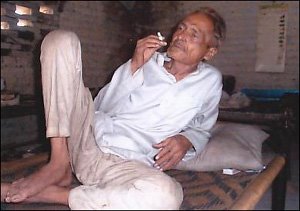Born to lower caste, Lal Singh Dil made name with his pen

In the late sixties, when he used to recite poems, thousands of people would gather. Lal Singh Dil was a celebrated poet, akin to his contemporary revolutionary poets, Avtar Paash and Sant Ram Udasi (aka the "Punjabi poets"). He revolted against the unjust regime and fought not merely with his pen, but with a gun, as the American writer Ernest Hemingway fought. Lal Singh Dil, once a firebrand in Punjabi poetry, is currently going through tough times in his hometown of Samrala.
These days, most of his time is spent in a dark 10 x 13 room. One room corner still has marks from the last monsoon leakage and another has a small kitchen. Two walls of his room are colored with some written couplets. Except for a long row of mementos, it is hard to find anything in order. As soon as I reached his place, he came upstairs without looking at me, even without any query, and started making tea.
"Now I am in my late sixties and my health is quite poor, even sometimes I find it hard to breathe, otherwise everything is fine," he began to speak as if he was talking to himself.
When asked about his financial resources, he whispered, "Earlier, I was running a highway tea stall, but three years back that too had to close down. After that, conditions were severe; even sometimes I didn't have money to post letters. Now, a publisher gives me five hundred rupees ($13) every month as royalty for my books. Recently, I got some money for honor, which I deposited in a bank and I'm waiting when it will be finished. You can't read or write with an empty stomach.
Dil was the first in his family to finish school. On every step of his life, he faced humiliations because of his low caste. In the early sixties, as he was studying in his tenth standard, his first poem appeared in the famous Punjabi literary journal Preetlari. In the early seventies, he compiled an anthology of poems titled "Satluj di Hawa", meaning "The Winds of Satluj" (one of the five rivers of Punjab), which is equal to an epoch in the history of Punjabi revolutionary poetry. "With the thunder of spring" (phrase used for an armed peasant uprising of the mid-sixties) he too joined the Naxalite movement and attacked a police station with his fellow comrades. Later on, he was arrested and imprisoned for nine months.
When asked about his treatment in custody, he became silent for a while and spoke with a thick voice, "Compared to my comrades, they tortured me more because I was from a lower caste. It was extreme. But I never bowed in front of jail authorities despite being humiliated, and as a result I got the name 'rebel.'"
Due to the brutal repression of the police, the whole Naxalite movement suffered a setback. Most of Dil's comrades were either killed in encounters or were imprisoned, so nobody was there to welcome him when he was released from jail. Thus, in depression, he left Punjab for Uttar Pradesh. There he adopted Islam and worked as a watchman. In the early eighties, he came back to Punjab because of his deep love for his motherland. Even then he did not get married because he wanted to live "free."
Asked whether it was a mistake to join the Naxalite movement, he answered with little resentment, "No...not at all, it was the struggle for the betterment of society, even today there is need for such struggles, but with valid means."
When asked what inspires him to still write, for the first time in our conversation he looked into my eyes and answered after a long pause. "Social injustice, physical torture and mental agony all motivate me to write," and he began to sing the following lines of his poem "Dance":
When the labourer woman
Roasts her heart on the tawa
The moon laughs from behind the tree
The father amuses the younger one
Making music with bowl and plate
The older one tinkles the bells
Tied to his waist
And he dances
These songs do not die
Nor either the dance...
Link
Related Links
A Readers Words - an excellent blog on literature, left, liberal, socialism, globalization, dalit, books, urdu poetry, south asia, India.
No comments:
Post a Comment
NOTE : The Comments section is provided in the interests of free speech only. It is mostly unmoderated, but comments that are off topic, offensive, slanderous, or otherwise annoying stand a chance of being deleted. The fact that any comment remains on the site IN NO WAY constitutes an endorsement by Naxal revolution, of any view expressed, fact alleged, or link provided in that comment.